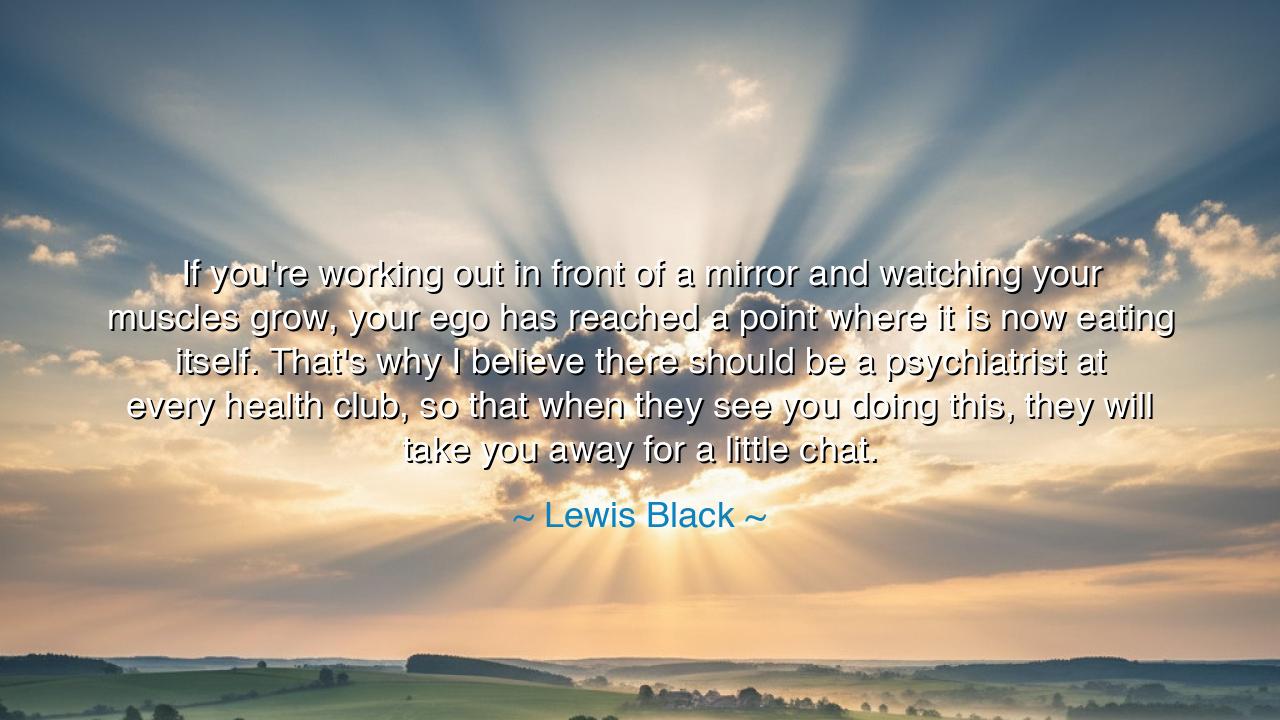
If you're working out in front of a mirror and watching your
If you're working out in front of a mirror and watching your muscles grow, your ego has reached a point where it is now eating itself. That's why I believe there should be a psychiatrist at every health club, so that when they see you doing this, they will take you away for a little chat.






“If you're working out in front of a mirror and watching your muscles grow, your ego has reached a point where it is now eating itself. That's why I believe there should be a psychiatrist at every health club, so that when they see you doing this, they will take you away for a little chat.” — thus spoke Lewis Black, the sharp-tongued jester of our age, whose humor often conceals profound truth. His words, though wrapped in laughter, strike like a philosopher’s hammer upon the fragile idol of ego. For he speaks not merely of the gym, nor of the body, but of a universal sickness — the vanity that devours the soul when admiration of the self becomes worship of the self.
In this quote, Black transforms jest into insight. The mirror before which one flexes and admires one’s own reflection becomes a symbol of self-obsession — that most ancient of human temptations. Once, the mirror was a tool of discovery; now, it becomes a shrine. The ego, that inner flame meant to give warmth and confidence, becomes a wildfire when left unguarded. The man who trains his body to grow stronger may begin with noble intent — to preserve his health, to cultivate discipline, to honor life’s gift. But when he turns his gaze inward too long, when he measures his worth only in his reflection, he crosses the invisible line where self-improvement becomes self-idolatry. It is there, says Black, that the mind itself begins to consume its own reason.
The ancients told a story of Narcissus, the beautiful youth who knelt by the still water and saw his reflection for the first time. He fell in love with it, not knowing it was his own image. Day by day, he watched himself, forgetting food, forgetting time, until at last he perished beside the pool, transformed into a flower — delicate, beautiful, and forever bent toward its reflection. This myth is the very echo of Lewis Black’s warning: when man becomes his own object of worship, his ego devours his soul, and his strength becomes his ruin. The mirror, once meant to reflect reality, becomes a trap that reflects only desire.
There is wisdom, too, in Black’s suggestion of the psychiatrist — not as mockery, but as medicine. For when the mind turns upon itself in vanity, it requires healing, not scorn. The health club becomes a temple of contradiction: a place where the body is trained but the spirit may decay if unchecked. The philosopher Socrates taught that to know oneself was the beginning of wisdom — but he did not mean to gaze endlessly at one’s muscles. He meant to see one’s inner truth, to examine one’s motives, to humble the ego through awareness. The psychiatrist, in Black’s humor, symbolizes this missing teacher — the guide who would remind the strong man that strength without humility is weakness in disguise.
This lesson extends far beyond the walls of the gym. For in every field — in wealth, art, power, or beauty — the same danger lurks. The artist who loves his fame more than his creation, the leader who craves applause more than justice, the scholar who worships his intellect rather than truth — all stand before the same mirror, lost in admiration of themselves. Ego, when fed too richly, becomes a serpent that coils inward, devouring its own tail. It isolates the soul from gratitude and blinds the heart to others. True growth, whether of body or spirit, is not about display but about mastery — the quiet strength that seeks improvement, not attention.
Consider Marcus Aurelius, emperor of Rome and philosopher of humility. Surrounded by power and worship, he reminded himself each morning, “Do not be Caesarized.” He knew that the greatest danger of greatness was forgetting one’s humanity. Though he commanded armies and governed nations, he practiced self-restraint, writing not for others, but to keep his own heart from swelling with pride. His was a mind that lifted weights of wisdom, not iron, yet his discipline was the same: train the self, but never adore it.
The lesson, therefore, is clear: cultivate strength, but guard your soul. Use the mirror as a tool, not a master. When you strive for excellence — in body, in work, in art — do so not for vanity, but for virtue. Ask yourself not how others will see you, but how truth will find you. Let your reflection be a reminder of effort, not an idol of ego. And if ever you find yourself too enamored with your own image, take, as Lewis Black suggests, a moment to speak with your inner psychiatrist — the voice of humility that dwells within all who listen.
So, my listener, remember this ancient jest dressed in modern form: the body is the servant of the soul, and the mirror reflects only the surface. The true measure of a person’s strength lies not in how their muscles gleam under light, but in how their character endures in darkness. Build your body, sharpen your mind, but above all, keep your heart free from the hunger of vanity. For in the end, the greatest weight you will ever lift is your own ego, and the greatest victory is to set it down.






AAdministratorAdministrator
Welcome, honored guests. Please leave a comment, we will respond soon